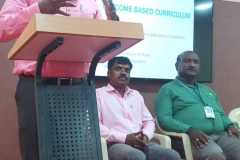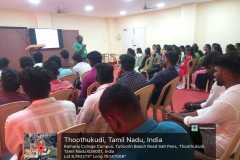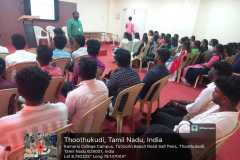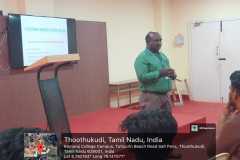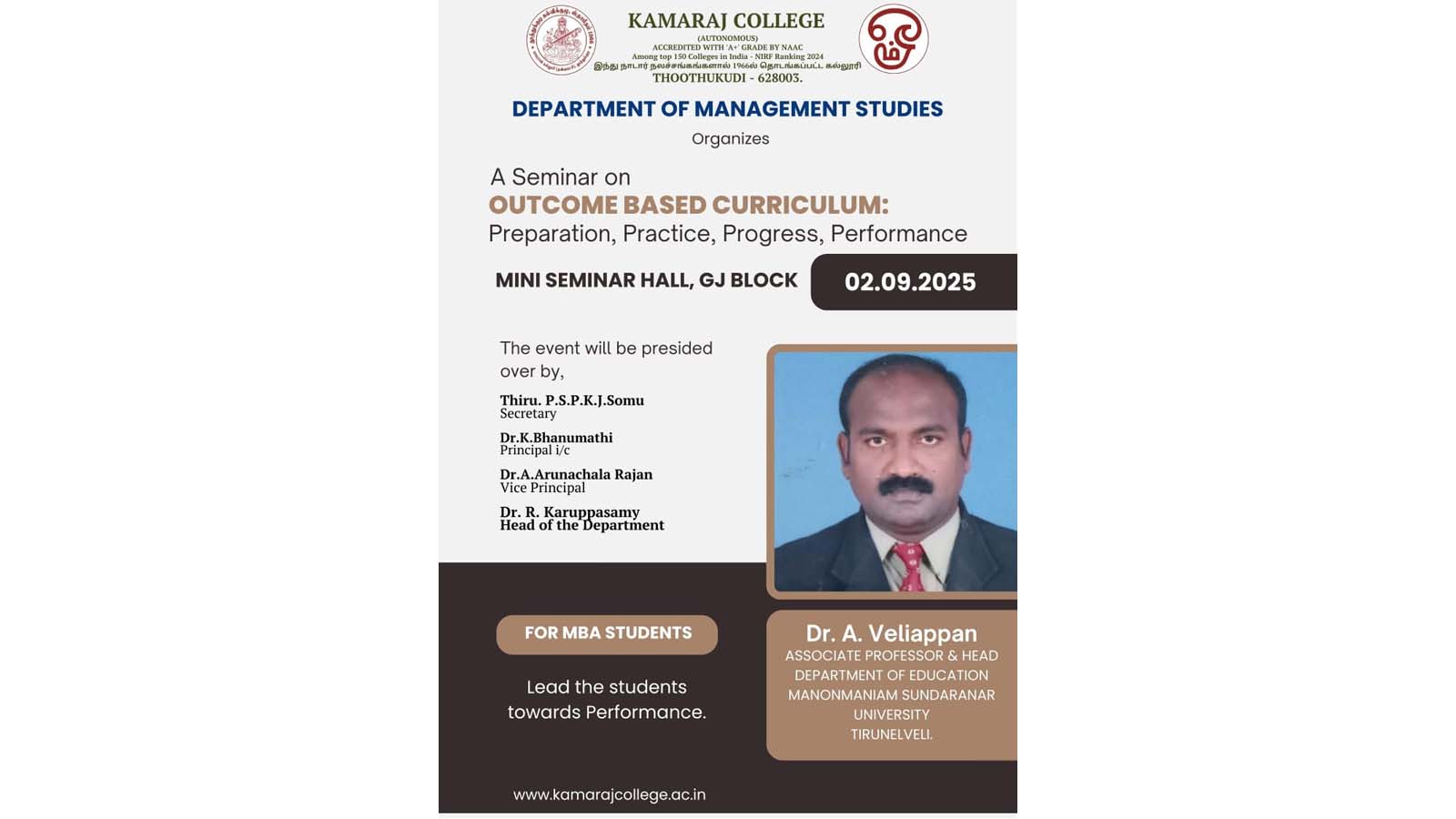
Outcome Based Curriculum Seminar 2025 Brings Powerful Insights for Management Studies Students
Outcome Based Curriculum Seminar
The Department of Management Studies at Kamaraj College, Thoothukudi, organized a thought-provoking seminar on Outcome Based Curriculum on 2nd September 2025 from 11.00 am to 01.00 pm at the Golden Jubilee Block. The seminar titled Outcome Based Curriculum Preparation Practice Progress Performance aimed at guiding students and faculty towards the modern academic framework that focuses on measurable learning outcomes.
The session was led by the distinguished academician, Dr. A. Veliappan, Head of the Department of Education at Manonmaniam Sundaranar University, Tirunelveli. With decades of experience in higher education and curriculum design, his insights created a valuable learning space for both students and teachers.
Leadership and Guidance in Organizing the Seminar
The seminar was conducted under the supportive leadership of Dr. K. Banumathi, Principal (in-charge) of Kamaraj College, and Dr. A. Arunachala Rajan, Vice Principal. Their encouragement ensured that the Department of Management Studies could successfully organize an event that merged theory with practice.
The program began with a warm welcoming address by Dr. R. Karuppasamy, Head of the Department of Management Studies. In his speech, he highlighted the growing importance of designing and implementing an Outcome Based Curriculum to improve the academic and professional development of students. He also expressed his gratitude to the resource person for taking the time to guide students in this significant area.
Outcome Based Curriculum and its Four Pillars
The keynote address by Dr. Veliappan centered on the four essential aspects of an Outcome Based Curriculum. His lecture connected theory with practical applications in education, ensuring that the audience understood the value of preparation, practice, progress, and performance in teaching and learning.
- Preparation: Dr. Veliappan emphasized the importance of aligning learning objectives with the vision and mission of the institution. Preparation sets the foundation of an effective curriculum where every course is designed to build towards clear, measurable outcomes.
- Practice: He explained that teaching methods and classroom strategies should be carefully designed to help students achieve targeted learning outcomes. Practice includes the use of innovative teaching tools, group work, projects, and case studies that support the development of skills alongside theoretical understanding.
- Progress: The lecture highlighted the need for continuous assessment and effective feedback systems to track student improvement. Progress is not a one-time result but a continuous process of growth, reflection, and learning adjustments.
- Performance: Finally, performance was described as the ultimate measure of the curriculum’s effectiveness. Student achievements, employability, professional skills, and societal contributions serve as indicators of how well the Outcome Based Curriculum has been implemented.
Interactive Learning and Student Participation
The seminar stood out for its interactive nature. Instead of a one-way lecture, Dr. Veliappan engaged with the students and encouraged them to share their perspectives. Questions about classroom practices, evaluation methods, and industry requirements were discussed in detail.
A total of 48 students from the Department of Management Studies participated actively in the program. Their enthusiasm and engagement showed the growing interest in understanding how an Outcome Based Curriculum can bridge the gap between traditional education and industry demands.
Value and Impact of the Seminar
The session proved to be highly enriching and valuable. Students learned how curriculum planning goes beyond classroom teaching and becomes a framework for shaping the future of graduates. They gained practical guidelines for linking teaching methods, learning activities, and assessments with measurable outcomes.
The program not only enriched the students academically but also prepared them for the challenges of future workplaces where skill-based performance is the key to success. For faculty members, the seminar served as a reminder that constant innovation and evaluation in teaching practices are vital to staying relevant in modern education.
Conclusion on the Outcome Based Curriculum Seminar
The seminar on Outcome Based Curriculum Preparation Practice Progress Performance left a strong impact on the participants. It highlighted how carefully planned educational strategies can make students industry-ready and socially responsible.
By bringing in the expertise of an academic leader like Dr. Veliappan, Kamaraj College once again proved its commitment to offering students holistic learning experiences. The seminar was a reminder that modern education must go beyond memorization and grades. Instead, it must focus on outcomes that reflect knowledge, skills, and the ability to contribute to society.
With active participation from students, dedicated guidance from the Principal and Vice Principal, and the expertise of the resource person, the seminar was a true success. The Department of Management Studies has set another milestone in preparing its students for a future that demands knowledge, innovation, and measurable results.

